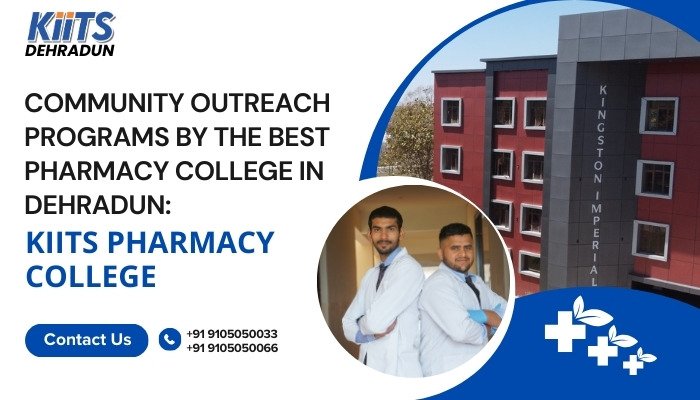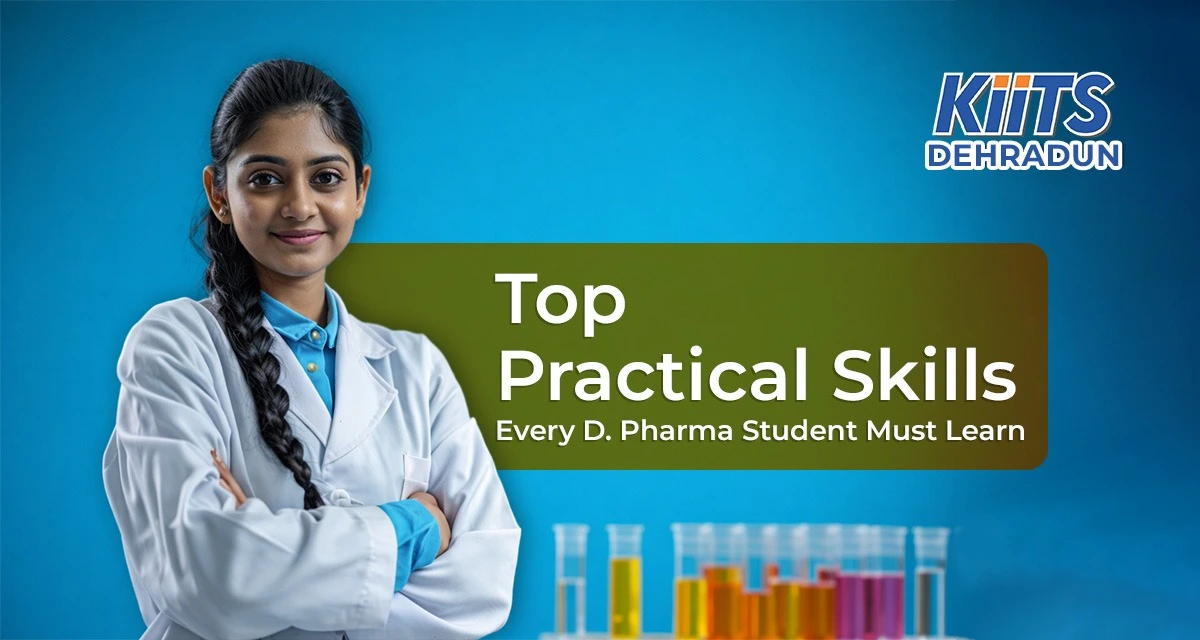Community outreach programs play a vital role in bridging the gap between academic institutions and the communities they serve. KIITS Pharmacy College, recognized as the best pharmacy college in Dehradun, has set a benchmark in this regard. By integrating community service into its core mission, KIITS Pharmacy College not only enriches the educational experience of its students but also significantly contributes to the well-being of the local population. This article explores the various community outreach initiatives undertaken by KIITS Pharmacy College, highlighting the impact of these programs and the benefits they provide to both students and the community.
The Vision of KIITS Pharmacy College
KIITS Pharmacy College, renowned as the best pharmacy college in Dehradun, is committed to excellence in education, research, and community service. The institution believes that the role of a pharmacy college extends beyond the classroom and laboratory. By engaging in community outreach programs, KIITS Pharmacy College aims to:
Enhance Public Health: Provide accessible healthcare services and education to underserved populations.
Promote Health Awareness: Educate the community on various health issues, preventive measures, and healthy lifestyle choices.
Foster Student Development: Offer students practical experience and opportunities to apply their knowledge in real-world settings.
Build Community Relationships: Strengthen the bond between the college and the local community through collaborative efforts.

Key Community Outreach Programs
KIITS Pharmacy College has implemented several community outreach programs that address various health and social issues. These initiatives are designed to be sustainable and impactful, ensuring long-term benefits for the community. Here are some of the notable programs:
1. Health Camps and Free Medical Clinics
Objective: To provide basic healthcare services and screenings to underserved and rural populations.
Activities:
Conducting regular health camps in remote areas.
Offering free medical check-ups, including blood pressure, blood sugar, and cholesterol screenings.
Providing free medicines and health consultations.
Educating the community on common health issues and preventive measures.
Impact:
Improved access to healthcare services for rural and underserved communities.
Early detection of health issues, leading to timely interventions.
Increased health awareness and knowledge among the local population.
2. Health Awareness Campaigns
Objective: To educate the community on various health topics and promote healthy lifestyle choices.
Activities:
Organizing awareness drives on topics such as diabetes, hypertension, cancer, and infectious diseases.
Conducting workshops and seminars on nutrition, exercise, mental health, and hygiene.
Distributing informational pamphlets and educational materials.
Using social media and local media channels to reach a broader audience.
Impact:
Enhanced knowledge of health issues and preventive measures among community members.
Positive changes in health behaviors and lifestyle choices.
Reduced incidence of preventable diseases.
3. School Health Programs
Objective: To promote health and hygiene among school children and educate them on the importance of a healthy lifestyle.
Activities:
Conducting health check-ups and screenings for school children.
Educating students on personal hygiene, nutrition, and physical activity.
Organizing interactive sessions and activities to engage students in health topics.
Training teachers and school staff on basic health and first aid practices.
Impact:
Improved health and hygiene practices among school children.
Increased awareness of nutrition and physical activity benefits.
Early identification and management of health issues in children.
4. Women’s Health Initiatives
Objective: To address health issues specific to women and promote their well-being.
Activities:
Conducting health camps focused on women’s health, including reproductive health and maternal care.
Providing education on topics such as menstrual health, family planning, and breast cancer awareness.
Offering counseling and support services for women facing health and social challenges.
Collaborating with local women’s organizations and community groups.
Impact:
Improved access to healthcare services for women.
Increased awareness and knowledge of women’s health issues.
Empowerment of women to take control of their health and well-being.
5. Geriatric Health Programs
Objective: To address the health needs of the elderly population and improve their quality of life.
Activities:
Organizing health camps and screenings specifically for the elderly.
Providing education on managing chronic conditions, medication adherence, and healthy aging.
Offering counseling and support services for mental health and social isolation issues.
Collaborating with local senior centers and organizations.
Impact:
Improved health outcomes and quality of life for elderly individuals.
Increased awareness of aging-related health issues and management strategies.
Enhanced support systems for the elderly in the community.
Student Involvement and Benefits
Student involvement is a cornerstone of the community outreach programs at KIITS Pharmacy College. By participating in these initiatives, students gain invaluable experiences and develop a range of skills that are essential for their future careers as healthcare professionals.

Practical Experience and Skill Development
Hands-On Learning: Students apply their theoretical knowledge in real-world settings, gaining practical experience in patient care, health education, and community service.
Communication Skills: Interacting with diverse populations enhances students’ communication and interpersonal skills, which are crucial for effective patient care.
Problem-Solving: Addressing the unique health needs of different communities fosters critical thinking and problem-solving abilities.
Professional Growth and Networking
Exposure to Healthcare Systems: Students gain insights into the healthcare challenges faced by underserved populations and the functioning of community health systems.
Professional Relationships: Working alongside healthcare professionals, faculty, and community leaders helps students build valuable professional networks.
Empathy and Compassion: Engaging with communities in need cultivates empathy, compassion, and a commitment to service, which are essential qualities for healthcare professionals.
Academic and Career Advancement
Research Opportunities: Community outreach programs often provide opportunities for students to engage in research projects, contributing to their academic growth.
Resume Building: Participation in community service initiatives enhances students’ resumes, making them more competitive for internships, scholarships, and job opportunities.
Career Preparedness: The practical skills and experiences gained through community outreach programs prepare students for various career paths in pharmacy and healthcare.
Collaboration and Partnerships
KIITS Pharmacy College recognizes the importance of collaboration and partnerships in maximizing the impact of its community outreach programs. By working with local organizations, healthcare providers, and government agencies, the college ensures that its initiatives are well-coordinated and sustainable.
Local Healthcare Providers
Collaboration with Hospitals and Clinics: Partnering with local healthcare facilities allows the college to provide comprehensive healthcare services during health camps and clinics.
Referral Systems: Establishing referral systems ensures that individuals who need further medical care can access appropriate services.
Government Agencies
Public Health Initiatives: Working with government health departments enables the college to align its programs with public health priorities and access additional resources.
Policy Advocacy: Collaborating with government agencies allows the college to advocate for policies that support community health and well-being.
Non-Profit Organizations
Community Support: Partnering with non-profit organizations helps the college reach a broader audience and provide holistic support to communities.
Resource Sharing: Collaborations with non-profits enable resource sharing, such as educational materials, medical supplies, and funding.

Academic Institutions
Research Collaborations: Partnering with other academic institutions enhances research efforts and promotes the exchange of knowledge and best practices.
Student Exchange Programs: Collaborations with other colleges and universities facilitate student exchange programs, providing students with diverse learning experiences.
Measuring Impact and Continuous Improvement
To ensure the effectiveness of its community outreach programs, KIITS Pharmacy College employs a robust system for measuring impact and continuous improvement. This involves:
Data Collection and Analysis
Health Outcomes: Tracking health outcomes, such as changes in disease prevalence, vaccination rates, and health behaviors, to measure the impact of interventions.
Participant Feedback: Collecting feedback from program participants to assess satisfaction and identify areas for improvement.
Program Evaluation: Conducting regular evaluations of programs to determine their effectiveness and identify best practices.
Continuous Improvement
Adapting Programs: Using data and feedback to adapt programs to better meet the needs of the community.
Professional Development: Providing ongoing training and development opportunities for faculty and students involved in community outreach.
Innovation: Encouraging innovation and the adoption of new approaches and technologies to enhance the impact of community outreach programs.
Conclusion
KIITS Pharmacy College, the best pharmacy college in Dehradun, exemplifies how academic institutions can play a pivotal role in community health and well-being through comprehensive outreach programs. By addressing the health needs of underserved populations, promoting health awareness, and providing students with valuable learning experiences, KIITS Pharmacy College sets a standard for community engagement and service.
Through its health camps, awareness campaigns, school health programs, women’s health initiatives, and geriatric health programs, the college makes a significant impact on the community. The involvement of students in these programs not only enhances their education but also prepares them to be compassionate and skilled healthcare professionals.
Collaboration and partnerships further strengthen the college’s outreach efforts, ensuring that programs are sustainable and aligned with broader public health goals. By continuously measuring impact and striving for improvement, KIITS Pharmacy College demonstrates its commitment to excellence in both education and community service.
In conclusion, the community outreach programs of KIITS Pharmacy College are a testament to the institution’s dedication to improving public health and fostering the development of future healthcare leaders. Through these initiatives, KIITS Pharmacy College not only solidifies its reputation as the best pharmacy college in Dehradun but also makes a lasting difference in the lives of the people it serves.








